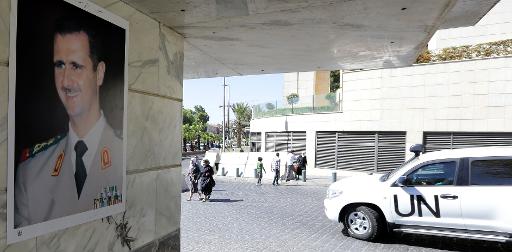The United States is skeptical about Syria's declaration of its chemical weapons to an international watchdog and is still checking its accuracy, a top US envoy said Tuesday.
Syrian President Bashar al-Assad agreed to destroy all his banned chemical arms by mid-2014 as part of a Russia-US deal that headed off the threat of a US military strike.
Samantha Power, Washington's envoy to the United Nations, said experience dealing with Assad has led to US "skepticism."
Other Western envoys say their countries also have strong doubts about a 700-page declaration of Syria's chemical weapons sites and arms made to the Organization for the Prohibition of Chemical Weapons (OPCW).
Damascus has also met a deadline to destroy its chemical and weapons production facilities and been praised for its cooperation by international inspectors.
But "more work of course remains to be done to ensure that the Syrian government's list of declared sites is comprehensive and that the process remains on track, particularly as we enter the destruction phase," Power said.
American experts are still studying the "extremely technical" Syrian document, Power told reporters after UN Security Council consultations on Syria's chemical weapons.
"We obviously bring skepticism born of years of dealing with this regime, years of obfuscation in other contexts, and of course a lot of broken promises within the context of this current war," Power said.
"You will certainly hear from us in the event that we detect non-compliance or we detect significant discrepancies."
Other US officials said Washington is concerned that the Assad government could try to retain some of its stockpiles.
"There are some indications that certain elements of the Syrian regime want to preserve their chemical weapons stockpiles," one such official, who spoke on condition of anonymity, told AFP.
But the officials said the US administration has full confidence in OPCW inspectors and any Syrian breach of its obligations would be dealt with "through diplomatic channels."
"There are some officials who don't think the Syrians will complete the destruction of their chemical weapons," said a second official, and there are others "who are cautiously optimistic that will happen."
A senior official from another Western nation said there was "widespread doubts" that all Syrian arms had been declared.
"But we will let the OPCW do their work," the official said.
A chemical weapons destruction plan was brokered by Russia and the United States after an August 21 poison gas attack in the Damascus suburbs.
Assad's government denies responsibility. Russia, the president's main backer, has also blamed opposition rebels. But the United States says government forces staged the attack, killing more than 1,400 people.
"The chemical weapons agreement and implementation has not changed the US position on Assad," Power said.
"A man who gases his people and who uses Scuds and all other forms of terror against his people is not fit to govern those people."
While the Syrian war, which the UN says has left well over 100,000 dead, rages on, OPCW experts have visited 21 of the 23 sites that have 39 of the 41 arms facilities declared by Syria.
Sigrid Kaag, head of the joint OPCW-UN mission, would not comment on whether arms are suspected to be hidden.
"The mission is operating on the mandate provided and it works on the basis of the Syria declaration provided to the OPCW," she told reporters after briefing the Security Council on the experts' work.
Under a Security Council backed blueprint, a plan has to be drawn up by November 15 for the destruction of Syria's chemicals. Diplomats say this is still being hammered out by Russia and the United States.
Few countries have the capacity to execute the destruction, however.
Norway, which had been mentioned as a candidate to accept the chemicals, has already said it cannot carry out the eradication operation because of the tight deadline and legal obstacles.
Russian UN Ambassador Vitaly Churkin said after the latest talks that his country would not carry out the destruction but could take part in the operation.





















































